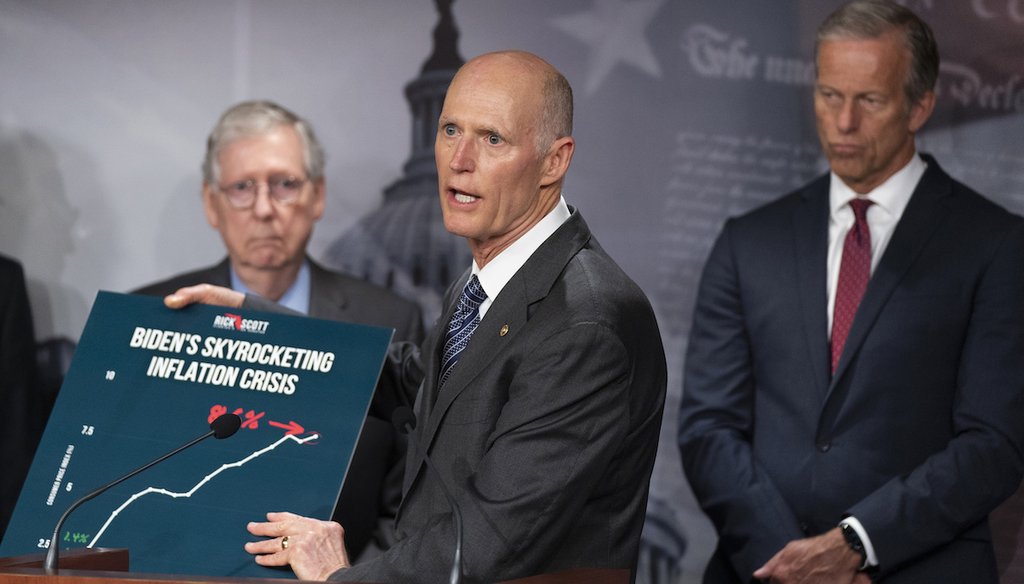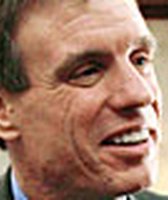Get PolitiFact in your inbox.

Sen. Rick Scott with Senate Minority Leader Mitch McConnell of Ky., left, and Sen. John Thune, R-S.D., holds up a graph as he speaks during a news conference following the Republican policy luncheon, July 12, 2022, in Washington. (AP)
If Your Time is short
• Cutting taxes for Americans of average income in today’s economy — with inflation at a 40-year high — would put more money in Americans’ hands, driving consumption beyond current levels of supply and leading to higher prices, economists say.
• In some situations, cutting taxes does not lead to higher inflation, such as when inflation is steadily low. And if there’s a recession, tax cuts can help spark needed demand without necessarily pushing prices higher.
One of the most common Republican messages during the 2022 midterm campaigns has been that President Joe Biden is to blame for inflation, which reached a 40-year high during the past year.
Republicans have said, with some justification, that Biden’s spending programs, including his effort to forgive some student loan debt, have fueled inflation by putting more money in consumers’ hands.
However, key Republican leaders have said that if they regain power in Congress, one of their favored policy solutions will be to cut taxes, by permanently extending tax cuts signed by former President Donald Trump.
Economists across the ideological spectrum have warned that would boost inflationary pressures.
On the Oct. 30 edition of CNN’s "State of the Union," Florida Republican Sen. Rick Scott, who heads the Senate GOP’s campaign arm, brushed off the idea that tax cuts and inflation could be linked.
"Inflation is not caused because you cut taxes," Scott said during an exchange with host Dana Bash.
Bash had cited economists’ concerns about cutting taxes and pointed out that the nonpartisan Congressional Budget Office has said doing so would add almost $3 trillion to the deficit. She asked Scott, "So, how is that fiscally responsible?"
Scott replied that when he cut taxes in Florida and when Trump cut taxes nationally, revenue grew. He also said that inflation is caused by "not living within our means, by having a government that spends more than it takes in, by causing a regulatory environment that makes it difficult for people to produce foods, make it have a regulatory environment that causes gas prices to go up, have diesel prices to go up, and natural gas prices go up."
Is Scott right that cutting taxes doesn’t cause inflation?
Scott’s office said it stood by the senator’s remarks in the interview, when also taking into account his assertion that "I cut taxes 100 times and fees 100 times as governor, and our revenues grew, because you start building the private sector."
But economists say there are big differences between cutting taxes as a governor when inflation is low and cutting taxes nationally when inflation is at a 40-year-high.
One big reason for current high inflation is a shortage of supply to meet high levels of demand, economists said. They say cutting taxes would push demand for products even further beyond current levels of supply, sending prices higher.
Are tax cuts inflationary?
Ultimately, a tax cut’s timing and nature will determine whether it drives inflation, economists say.
If inflation is low, as it had been until recently, a tax cut would be unlikely to spark inflation on its own. And if the economy is in a recessionary tailspin, tax cuts can bolster flagging demand, fostering recovery.
"You can’t just look at fiscal policy in isolation," said Douglas Holtz-Eakin, president of the center-right American Action Forum.
Tax cuts can even be anti-inflationary, when they are geared toward boosting capital investment by business or reducing transportation bottlenecks, said Gary Burtless, an economist with the Brookings Institution, a nonpartisan think tank in Washington, D.C.
The tax cuts Scott made while serving as Florida governor from 2011 to 2019 would not have significantly affected inflation, economists said. That’s because for the first half of Scott’s tenure, the U.S. was recovering from the Great Recession. And during his entire tenure as governor, inflation was far lower than it is now.
Would a tax cut now drive inflation higher?
Neither of the two scenarios in which tax cuts do not drive inflation — when inflation is low or the economy is in recession — applies now.
"There is a pretty broad consensus that tax cuts lead to increased consumption, which if we're near full employment, as is the case now, would be inflationary," said Dean Baker, co-founder of the liberal Center for Economic and Policy Research.
A tax cut crafted to benefit only the richest Americans might have the least inflationary impact, said Steve Fazzari, an economist at Washington University in St. Louis, because the wealthier you are, the less tax savings you will spend, meaning less inflationary pressure on demand.
But if politicians frame a tax cut as benefiting only the rich, it would reduce public support. And the more widely the benefits of a tax cut are shared, the more inflationary it becomes.
How a tax cut would interact with Federal Reserve policy
The most time-tested way of curbing inflation is through federal monetary policy. The Federal Reserve has so far implemented four consecutive rate hikes of three-quarters of a point, hoping to cool overheated demand. The idea is that the Fed’s rate hikes ripple through the economy, increasing the cost of borrowing money through mortgages, business loans and credit cards.
Collectively, the rate increases make it more expensive for consumers and businesses to make purchases, leading to lower demand and, ideally, pushing demand closer to supplies. When supply and demand are roughly in balance, inflation recedes.
Economists say that as the Fed hikes rates, it can effectively wield veto power over efforts to raise taxes or increase federal spending. This means the Fed’s efforts to make borrowing more expensive would neutralize the benefits of the tax cuts.
"The primary responsibility for inflation is the Fed," Holtz-Eakin said. "They have the tools, and they should be taking care of the problem."
Our Sources
Rick Scott, interview with CNN’s "State of the Union," Oct. 30, 2022
House Republican Conference, Commitment to America, accessed Nov. 4, 2022
Washington Post, "GOP wants to push to extend Trump tax cuts after midterm elections," Oct. 17, 2022
Bloomberg, "Tax Cuts for the Rich? In This Economy? GOP Playbook Faces Doubts," Oct. 28, 2022
Email interview with Gary Burtless, senior fellow at the Brookings Institution, Nov. 1, 2022
Email interview with Dean Baker, co-founder of the Center for Economic and Policy Research, Nov. 1, 2022
Email interview with Steve Fazzari, economist at Washington University in St. Louis, Nov. 1, 2022
Interview with Douglas Holtz-Eakin, president of the American Action Forum, Nov. 1, 2022
Email interview with McKinley P. Lewis, communications director for Rick Scott, Nov. 1, 2022


































